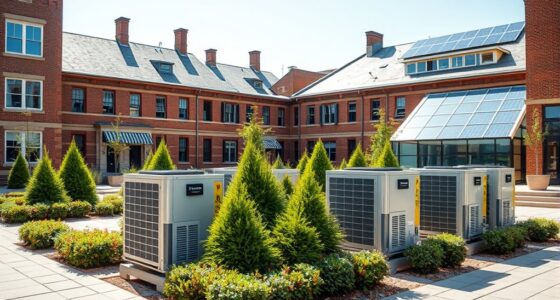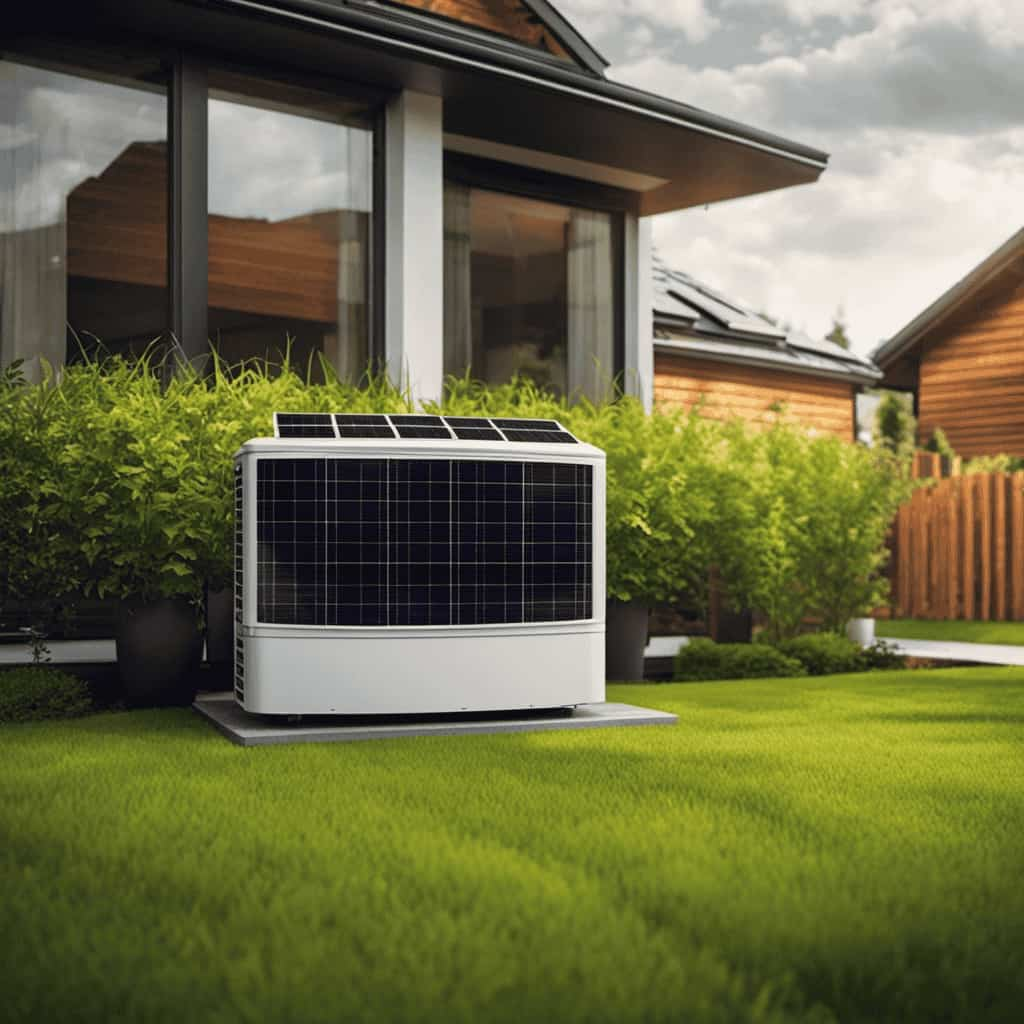Are you tired of constantly rising energy bills and inconsistent temperatures in your home? Look no further! Let us introduce you to the surprising advantages of home heat pumps.
With lower energy bills, increased energy efficiency, and a positive impact on the environment, heat pumps offer year-round comfort and improved indoor air quality.
Not only that, but they also require minimal maintenance and are eligible for tax credits and incentives.
Get ready to save money and increase your property value with residential heat pumps!
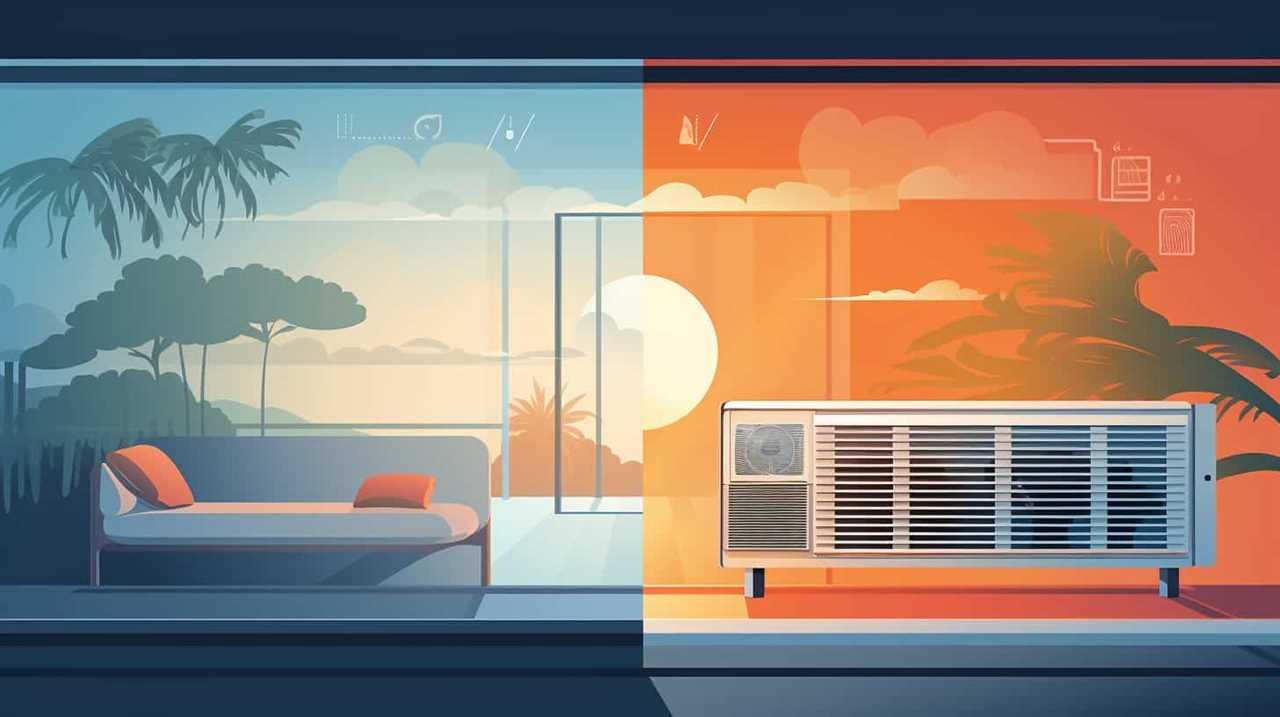
Key Takeaways
- Residential heat pumps provide significant cost savings and energy efficiency benefits, resulting in reduced utility bills and lower energy consumption.
- Heat pumps offer both heating and cooling capabilities, ensuring consistent comfort throughout the year.
- Heat pumps contribute to improved indoor air quality by filtering and purifying the air, reducing allergens and pollutants.
- Heat pumps have a long lifespan and are a cost-effective investment for homeowners, providing reliable heating and cooling for many years.
Lower Energy Bills
We can save money on our energy bills by installing a residential heat pump. Residential heat pumps are an energy-saving technology that can significantly lower carbon emissions. Unlike traditional heating and cooling systems, which rely on fossil fuels, heat pumps extract heat from the air or ground and transfer it indoors. This process requires less energy, resulting in reduced energy consumption and lower utility bills.
Heat pumps are highly efficient, with some models capable of achieving energy savings of up to 50%. By utilizing renewable energy sources, such as solar power, heat pumps can further reduce carbon emissions, making them an eco-friendly choice. Additionally, heat pumps provide both heating and cooling capabilities, eliminating the need for separate systems and further optimizing energy usage.
Installing a residential heat pump is a practical and cost-effective solution for reducing energy bills while contributing to a greener and more sustainable future.
Increased Energy Efficiency
Residential heat pumps offer increased energy efficiency and can significantly reduce overall energy consumption. Here are three reasons why they’re a great energy-saving technology for sustainable heating:
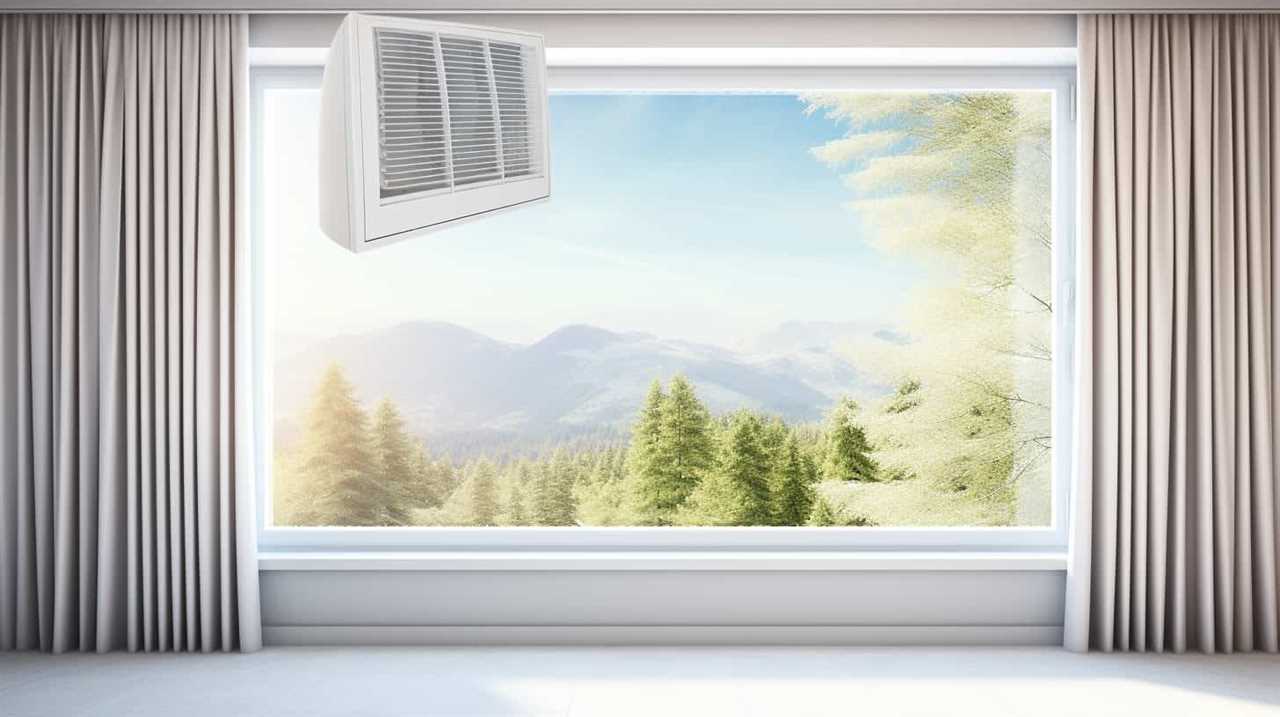
-
Efficient Heat Transfer:
Heat pumps work by transferring heat from the outside to the inside of a building, or vice versa. This process requires much less energy compared to traditional heating systems that generate heat. By efficiently utilizing heat transfer, heat pumps can help reduce energy consumption and save costs. -
Variable Speed Compressors:
Heat pumps equipped with variable speed compressors can adjust their operation according to the heating or cooling demand. This feature allows the heat pump to operate at optimal efficiency, consuming only the necessary amount of energy required to maintain the desired temperature. -
Energy Recovery Ventilation:
Some heat pumps have integrated energy recovery ventilation systems. These systems recover the energy from stale air being exhausted from the building and use it to precondition the incoming fresh air. By recovering and reusing energy, heat pumps with energy recovery ventilation further increase energy efficiency and reduce overall energy consumption.
Environmentally Friendly
With their low carbon emissions and energy-saving capabilities, residential heat pumps are a sustainable and environmentally friendly heating option. Heat pumps extract heat from the outside air or ground and transfer it into the home, eliminating the need for fossil fuels like oil or gas. This not only reduces carbon emissions but also helps to combat climate change. Additionally, heat pumps can save homeowners a significant amount of money on their energy bills. According to the U.S. Department of Energy, heat pumps can provide energy savings of up to 50% compared to traditional heating systems. This makes them an attractive option for those looking for sustainable heating solutions that also offer long-term cost savings.

| Advantages of Residential Heat Pumps |
|---|
| Low carbon emissions |
| Energy savings |
| Sustainable heating |
Year-Round Comfort
By providing consistent and efficient heating and cooling throughout the year, residential heat pumps ensure our comfort in all seasons. Here are three reasons why heat pumps contribute to year-round comfort and increased property value:
-
Temperature control: Heat pumps can both heat and cool your home, allowing you to maintain a comfortable indoor environment regardless of the weather outside. With the ability to adjust the temperature to your liking, you can enjoy a cozy home during winter and a cool oasis during summer.
-
Energy efficiency: Heat pumps are known for their high energy efficiency, which means they can provide comfort while saving you money on your energy bills. By utilizing renewable energy sources, such as the heat in the air or ground, heat pumps can efficiently heat and cool your home without relying solely on electricity.
-
Improved indoor air quality: Heat pumps not only regulate temperature but also help filter and purify the air inside your home. By eliminating allergens, dust, and other pollutants, heat pumps create a healthier indoor environment, reducing the risk of respiratory issues and improving overall well-being.
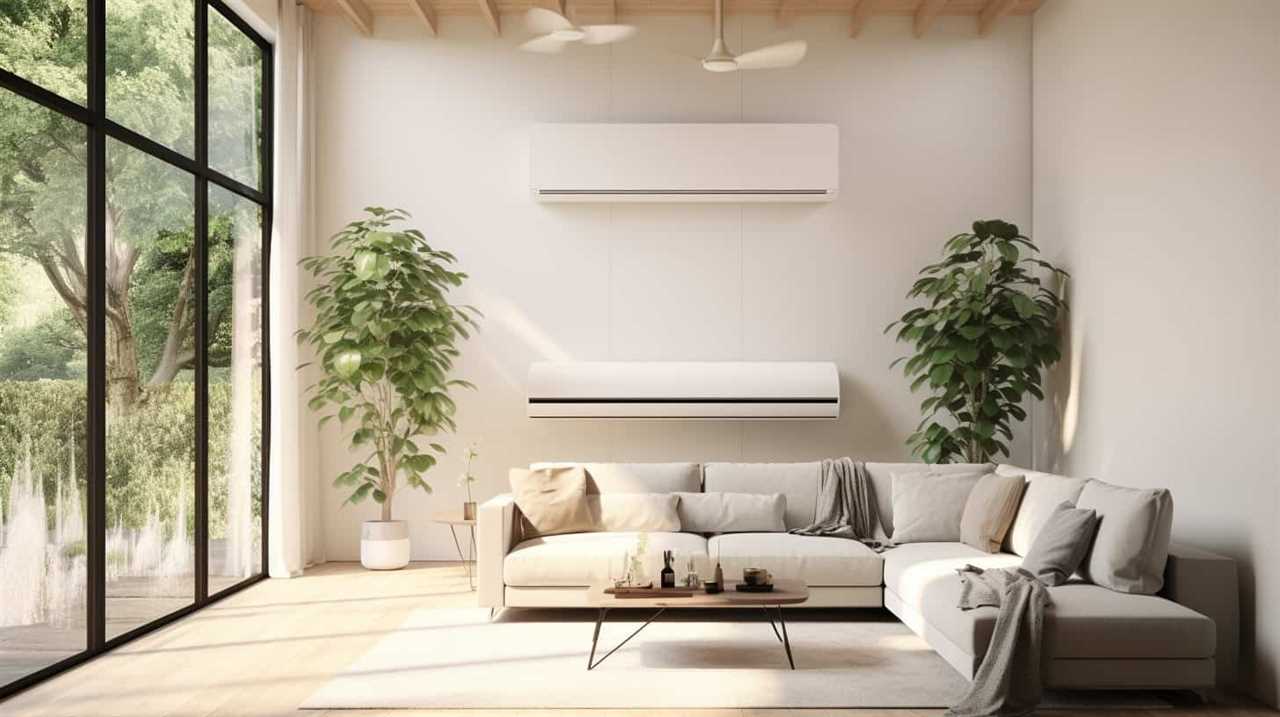
With year-round comfort and the added benefit of increased property value, residential heat pumps offer a reliable and cost-effective solution for your heating and cooling needs.
Now let’s explore how heat pumps can contribute to improved indoor air quality.
Improved Indoor Air Quality
One of the surprising advantages of heat pumps is that they can help us breathe cleaner and healthier air indoors. Heat pumps not only provide efficient heating and cooling, but they also contribute to improved indoor air quality.
How do they achieve this? Well, heat pumps promote improved air circulation by constantly exchanging stale indoor air with fresh outdoor air. This continuous air exchange helps to remove pollutants, allergens, and other harmful particles from the indoor environment.

Additionally, heat pumps are equipped with filters that capture and remove airborne particles, such as dust, pollen, and pet dander, further reducing allergens in the air.
Versatile Heating and Cooling Options
What are the versatile heating and cooling options offered by residential heat pumps?
Residential heat pumps provide a range of options for efficient and sustainable heating and cooling. Here are three key features that make them an excellent choice for homeowners:
-
Dual-functionality: Residential heat pumps can both heat and cool your home, offering year-round comfort. With energy-saving technology, these pumps can efficiently switch between heating and cooling modes, providing optimal temperature control.
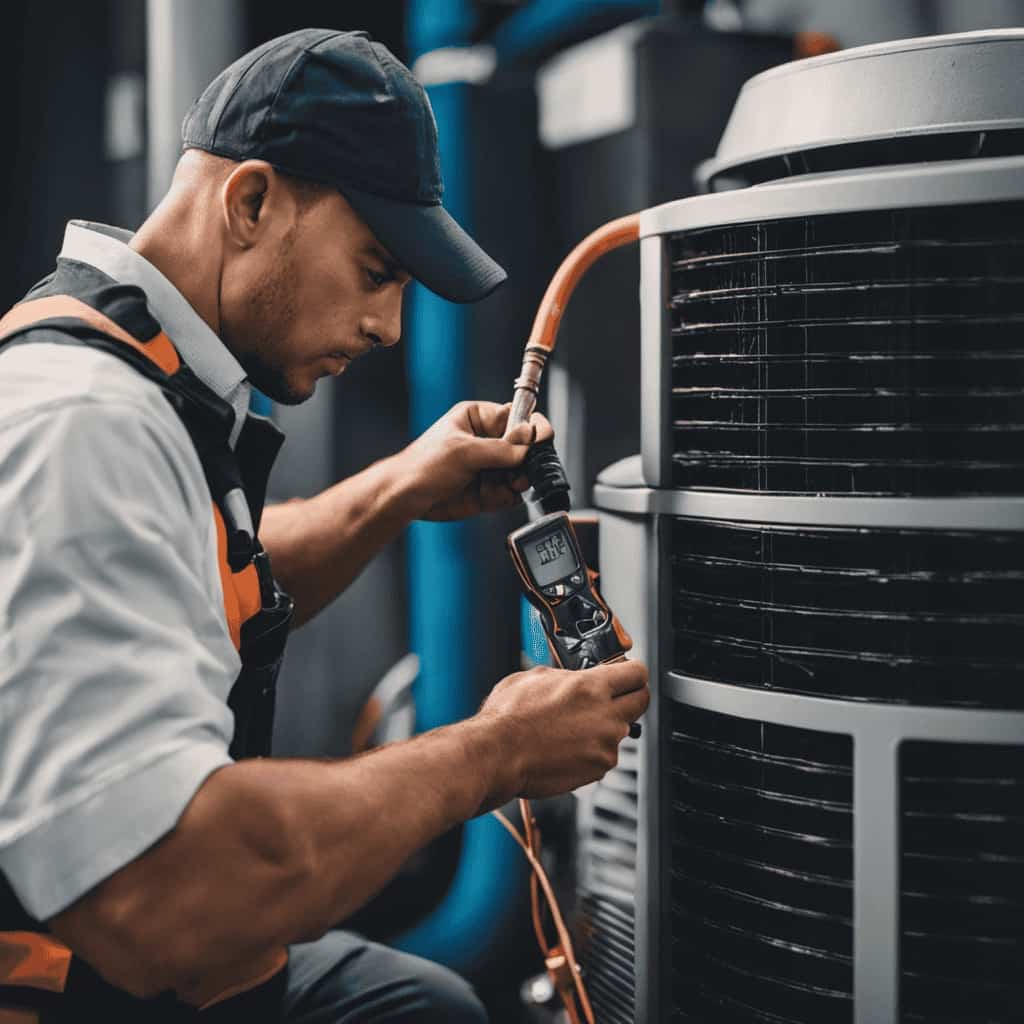
-
Zoning capabilities: Heat pumps allow for zoning, which means you can control the temperature of different areas or rooms in your home independently. This feature allows you to customize the comfort levels throughout your living space and reduce energy waste by only heating or cooling the areas that are in use.
-
Supplemental heating: In colder climates, residential heat pumps can be combined with a supplemental heating system, such as electric resistance heating or a gas furnace. This ensures that your home stays warm even in extreme temperatures while still benefiting from the energy-saving technology of the heat pump.
With their versatile functions and sustainable heating and cooling capabilities, residential heat pumps are an excellent choice for homeowners seeking efficient and environmentally friendly indoor climate control.
Long Lifespan
When it comes to residential heat pumps, one of the most surprising advantages is their long lifespan. These systems are built to last, making them a cost-effective investment for homeowners.

With proper maintenance and care, a heat pump can provide reliable heating and cooling for many years, making it an energy-efficient solution for residential properties.
Cost-Effective Investment
We can benefit from a cost-effective investment with a long lifespan by choosing residential heat pumps. When considering the cost savings and return on investment, it becomes clear why heat pumps are a wise choice. Here are three reasons why residential heat pumps offer a cost-effective investment:
-
Energy Efficiency: Heat pumps are highly efficient, using minimal energy to provide heating and cooling for your home. This translates into significant cost savings on your utility bills.
-
Durability: Residential heat pumps are designed to withstand the rigors of daily use. With proper maintenance, they can last for many years, providing reliable heating and cooling throughout their lifespan.

-
Low Maintenance Costs: Heat pumps require regular maintenance, but their simple design and fewer moving parts mean lower maintenance costs compared to other heating and cooling systems.
Choosing a residential heat pump ensures a cost-effective investment that will provide long-term savings and comfort for your home.
Now, let’s explore how heat pumps offer an energy-efficient heating solution.
Energy-Efficient Heating Solution
Residential heat pumps offer an energy-efficient, long-lasting solution for heating our homes. With an energy efficient installation process, these heat pumps are designed to maximize energy savings while providing consistent and comfortable heating throughout the year. The key to their efficiency lies in their ability to transfer heat from one location to another, rather than generating heat through combustion like traditional heating systems.
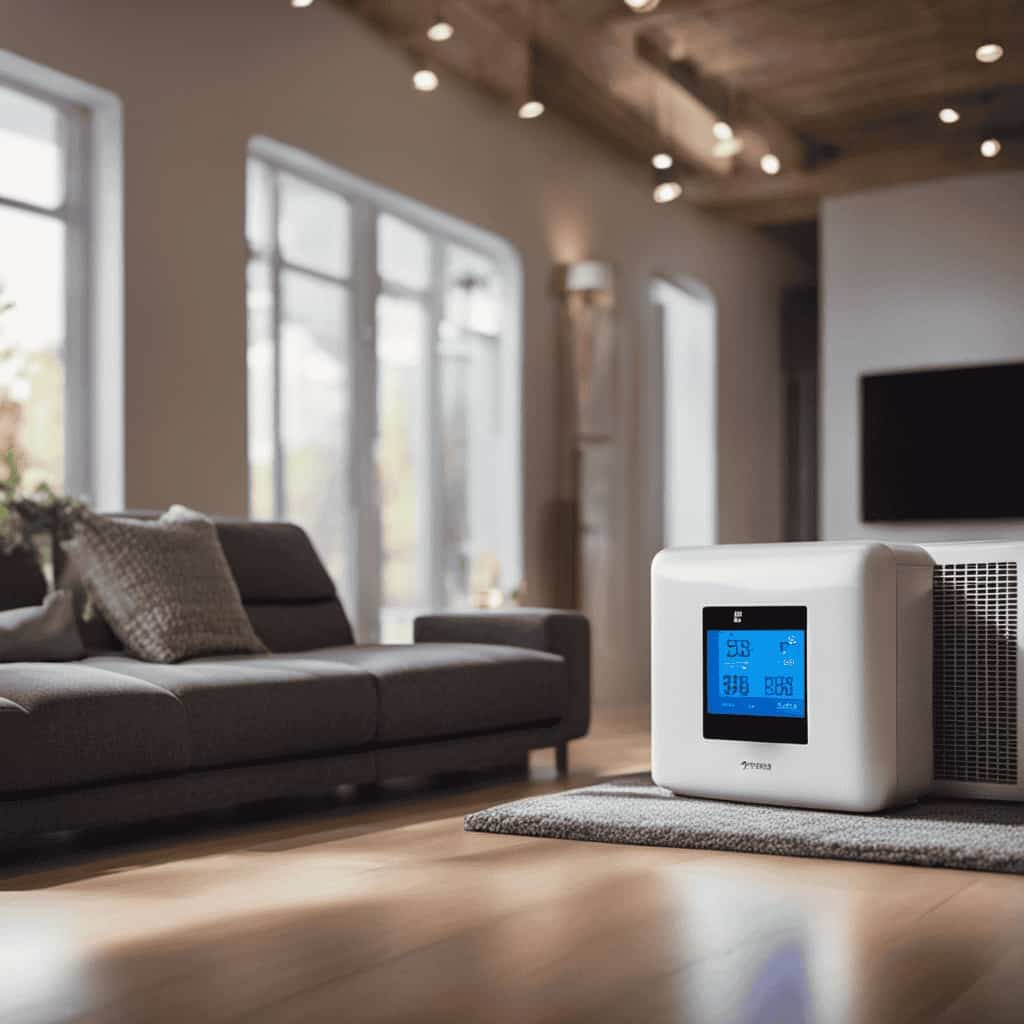
In addition to their energy efficiency, residential heat pumps also have the capability to integrate with renewable energy sources such as solar panels. This allows homeowners to further reduce their carbon footprint by utilizing clean and sustainable energy for heating their homes. By harnessing the power of the sun, heat pumps can provide reliable and efficient heating all while minimizing environmental impact.
This seamless integration of renewable energy sources not only benefits the environment but also helps homeowners save on energy costs in the long run. By transitioning into a discussion about the reduced carbon footprint of residential heat pumps, we can explore how these systems contribute to a more sustainable future.
Reduced Carbon Footprint
When it comes to residential heat pumps, one of the most significant advantages is their reduced carbon footprint. These systems are known for being environmentally friendly as they use renewable energy sources, such as the heat in the air or ground, to provide efficient heating for homes.
Environmentally Friendly Heating Option
Using heat pumps as a heating option offers a significant reduction in our carbon footprint, making it an environmentally friendly choice. Here are three reasons why heat pumps are a sustainable heating solution:

-
Energy Efficient Technology: Heat pumps work by transferring heat from one space to another, rather than generating heat directly. This process consumes less energy compared to traditional heating systems, resulting in lower greenhouse gas emissions. By utilizing energy-efficient technology, heat pumps help to mitigate the environmental impact caused by excessive energy consumption.
-
Reduced Dependence on Fossil Fuels: Heat pumps rely on electricity to operate, which can be generated from renewable sources such as solar or wind power. By reducing our reliance on fossil fuels for heating, heat pumps contribute to a cleaner and more sustainable energy mix.
-
Heat Recovery: Heat pumps can also provide both heating and cooling functions, enabling the recovery of heat from indoor spaces during the cooling process. This recovered heat can then be used to heat other areas of the building, further maximizing energy efficiency and minimizing waste.
Energy-Efficient Home Heating
By utilizing heat pumps for home heating, we can reduce our carbon footprint and achieve energy-efficient heating. Heat pumps are an energy-saving technology that transfers heat from one place to another rather than generating it directly. They work by extracting heat from the air or ground and transferring it into the home through a refrigerant cycle.
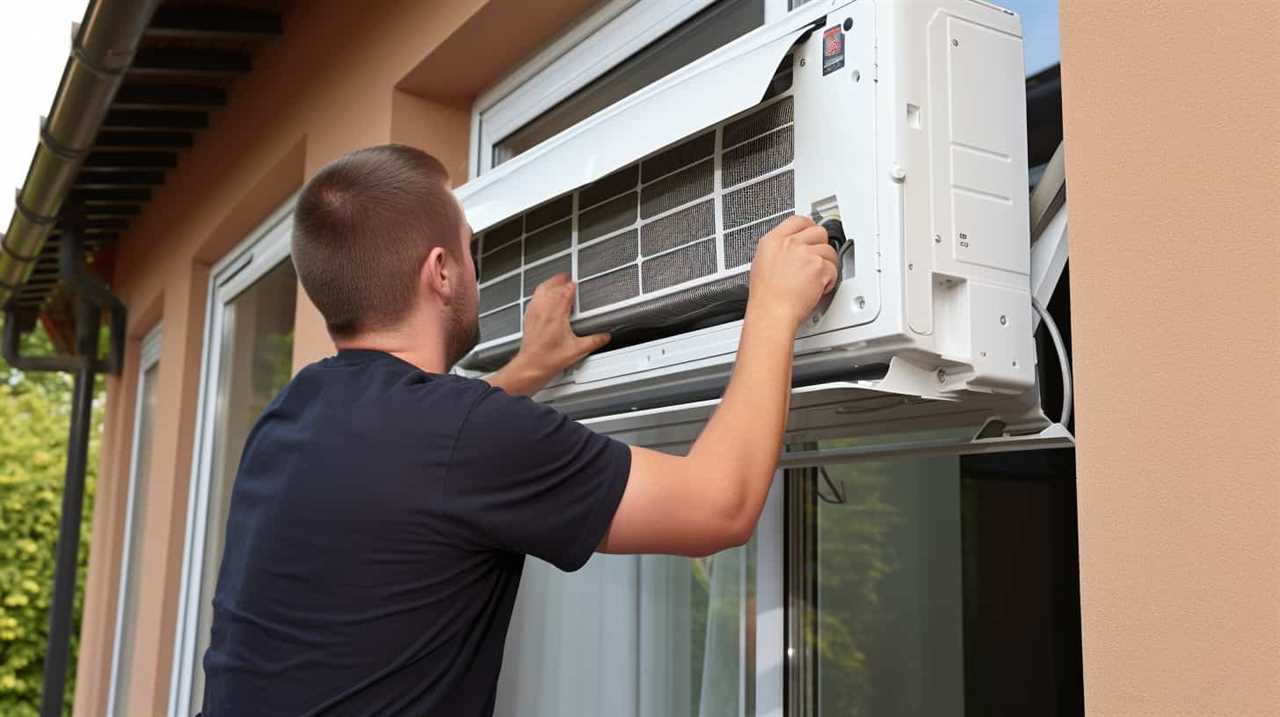
This process requires a small amount of electricity to operate the pump and compressor. Compared to traditional heating systems like furnaces or boilers, heat pumps can provide up to four times more energy in heating than the electricity they consume. This makes them a sustainable heating solution that not only reduces our reliance on fossil fuels but also helps us save on energy costs.
Greater Control Over Temperature and Humidity
With residential heat pumps, we have the ability to achieve greater control over the temperature and humidity levels in our homes. This not only results in greater comfort but also improved air quality.
Here are three ways in which residential heat pumps provide us with this control:
-
Precise temperature regulation: Heat pumps use advanced technology to accurately maintain the desired temperature in our homes. Whether it’s a chilly winter day or a hot summer afternoon, the heat pump adjusts the heating or cooling output to keep us comfortable.

-
Humidity management: Heat pumps can also control the humidity levels in our homes. They have the ability to remove excess moisture from the air during humid months, preventing mold growth and creating a more pleasant environment. Conversely, they can add moisture during dry seasons to combat dry skin and respiratory issues.
-
Zoning capabilities: Residential heat pumps often come with zoning capabilities, allowing us to set different temperatures for different areas of our homes. This means we can customize the temperature and humidity levels to suit individual preferences and needs in each room, ensuring everyone’s comfort.
Enhanced Safety Features
While residential heat pumps provide us with numerous benefits, such as greater control over temperature and humidity, they also offer enhanced safety features to ensure the well-being of our homes and families.
These improved safety measures are designed to minimize potential risks and provide peace of mind. One of the advanced security features of residential heat pumps is the inclusion of automatic shut-off mechanisms in case of emergencies. This feature detects any abnormal functioning or overheating and immediately shuts down the system to prevent further damage or potential hazards.

Additionally, heat pumps are equipped with built-in sensors and alarms that detect any gas leakages or carbon monoxide presence, ensuring a safe and healthy environment. Furthermore, many heat pumps come with child lock features to prevent accidental tampering by young children.
These enhanced safety features make residential heat pumps a reliable and secure heating and cooling solution for our homes.
Quiet Operation
We were pleasantly surprised by how quietly and smoothly residential heat pumps operate, providing us with a peaceful and comfortable environment. The lower noise levels of these heat pumps contribute to a serene ambiance in our homes. Here are three reasons why the quiet operation of residential heat pumps is a remarkable advantage:
-
Sound-dampening technology: Residential heat pumps are equipped with advanced noise reduction features that minimize operational noise. These include insulated compressor compartments and specially designed fan blades that reduce vibration and air turbulence, resulting in a quieter operation.

-
Variable speed capabilities: Heat pumps with variable speed compressors can adjust their speed based on the heating or cooling needs of the space. This allows the heat pump to operate at lower speeds, reducing noise levels significantly.
-
Minimal mechanical components: Unlike traditional heating and cooling systems, heat pumps have fewer mechanical components, which means there are fewer moving parts that can generate noise. This streamlined design ensures a peaceful operation that won’t disturb your daily activities or sleep.
With their lower noise levels and peaceful operation, residential heat pumps offer a quiet and tranquil living environment, enhancing the comfort of your home.
Minimal Maintenance Requirements
Because residential heat pumps have minimal maintenance requirements, we can enjoy the convenience and cost savings they offer.

Heat pumps are designed to be low-maintenance systems, requiring only routine check-ups and basic maintenance tasks. This is possible due to their simple design and efficient operation.
Regularly cleaning or replacing air filters is essential to ensure improved performance and energy efficiency. Additionally, it’s recommended to inspect and clean the outdoor unit to remove any debris that may hinder its functionality.
Another crucial maintenance task is checking the refrigerant levels and ensuring they’re within the recommended range, as low refrigerant levels can lead to decreased efficiency and increased energy consumption.
Eligible for Tax Credits and Incentives
One of the great advantages of residential heat pumps is that they’re eligible for tax credits and incentives. This means that homeowners can enjoy several tax credit benefits and incentive advantages when they choose to install a heat pump in their home.
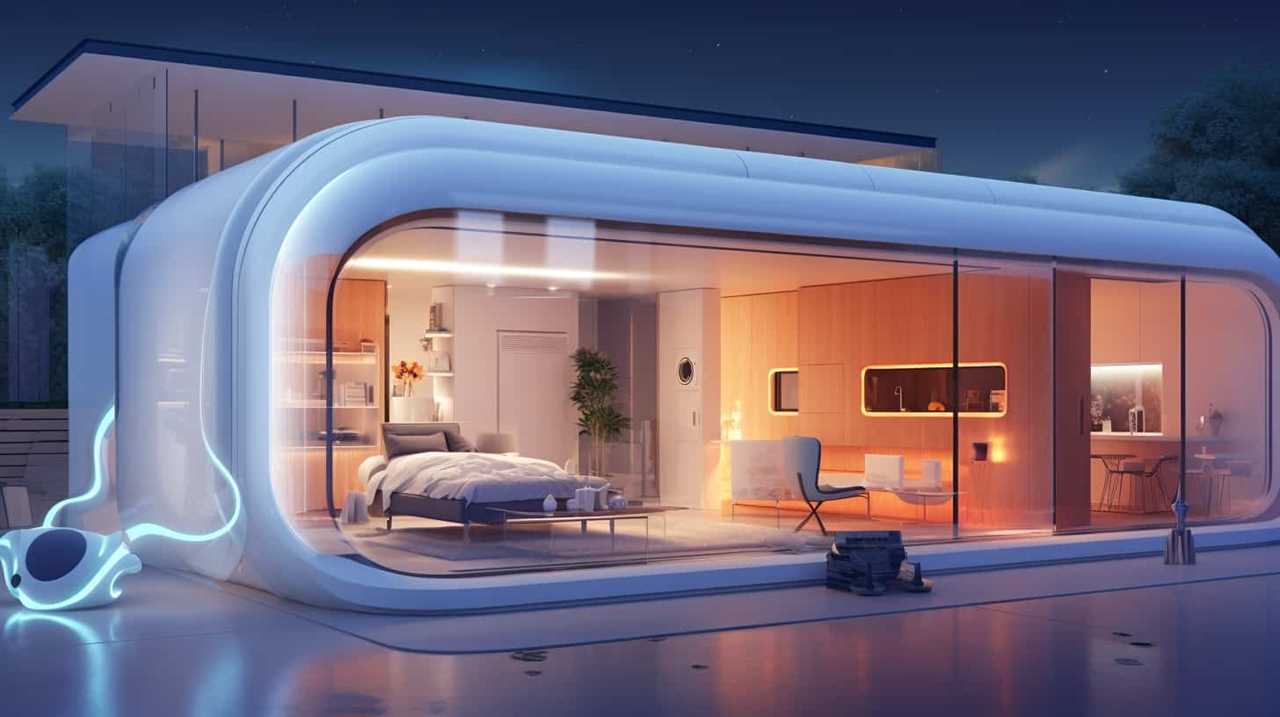
Here are three reasons why these tax credits and incentives are beneficial:
-
Financial savings: By taking advantage of these tax credits and incentives, homeowners can significantly reduce the cost of purchasing and installing a heat pump system. This can help make the initial investment more affordable and encourage more people to switch to this energy-efficient heating and cooling option.
-
Environmental benefits: Heat pumps are known for their energy efficiency and lower carbon footprint. By offering tax credits and incentives, governments aim to promote the adoption of these eco-friendly systems, thereby reducing greenhouse gas emissions and promoting a more sustainable future.
-
Energy independence: Heat pumps help reduce reliance on fossil fuels by utilizing renewable energy sources such as the air or ground. By providing tax credits and incentives for heat pump installation, governments encourage homeowners to become more energy independent and reduce their dependence on traditional heating and cooling methods.

With these tax credits and incentives, homeowners can’t only enjoy immediate cost savings but also contribute to a greener and more sustainable future.
Now, let’s explore the cost savings in the long run.
Cost Savings in the Long Run
When it comes to residential heat pumps, one of the most significant advantages is the cost savings in the long run.
These systems are highly energy-efficient, allowing homeowners to reduce their utility bills significantly.

Energy Efficiency Benefits
We frequently experience significant cost savings in the long run due to the energy efficiency benefits of residential heat pumps. These heat pumps are designed with energy-saving features that help lower carbon emissions and reduce electricity consumption.
Here are three ways in which residential heat pumps provide energy efficiency benefits:
-
Enhanced Insulation: Heat pumps are equipped with advanced insulation materials that prevent heat loss during operation. This ensures that the heat generated is efficiently distributed throughout the home, reducing the need for additional heating sources and ultimately saving energy.
-
Variable Speed Compressors: Residential heat pumps utilize variable speed compressors, which adjust the heating or cooling output based on the current temperature requirements. This allows the heat pump to run at a lower capacity when the demand is low, resulting in reduced energy consumption.
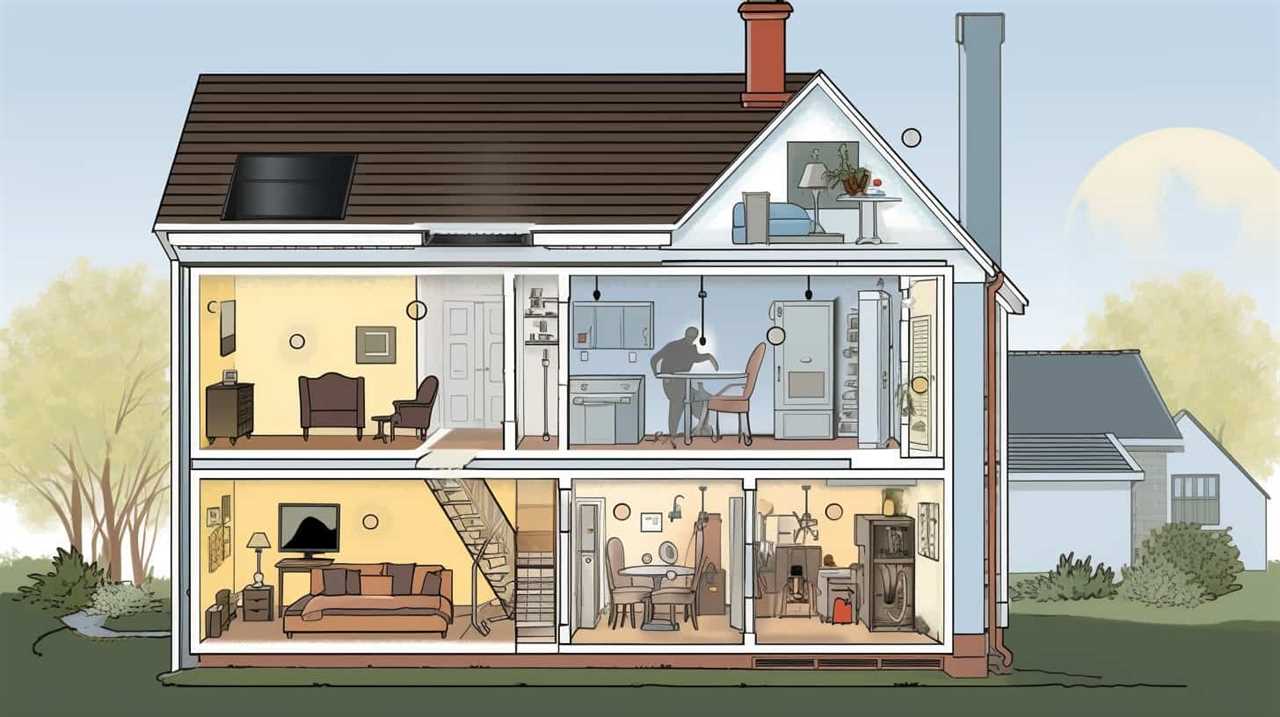
-
Smart Thermostat Integration: Many residential heat pumps can be integrated with smart thermostats, allowing homeowners to optimize their energy usage. These thermostats can be programmed to adjust the temperature settings based on occupancy patterns, ensuring that energy isn’t wasted when no one is home.
Reduced Utility Bills
Our residential heat pumps can lead to significant cost savings in the long run by reducing utility bills. By utilizing advanced technology and efficient operation, heat pumps can greatly reduce energy consumption compared to traditional heating and cooling systems. This translates into lower utility bills for homeowners, providing them with substantial financial savings over time.
One of the main reasons why residential heat pumps result in reduced energy consumption is their ability to extract heat from the outside air, even in colder temperatures. This allows the heat pump to provide heating during winter months without relying solely on electrical resistance or gas combustion, which can be costly. Additionally, heat pumps can also be used for cooling during summer months, further contributing to energy savings.
To illustrate the potential cost savings, let’s consider a hypothetical scenario comparing a heat pump with a traditional HVAC system. The table below provides an estimation of annual energy costs for a 2,000 square foot home in a moderate climate:
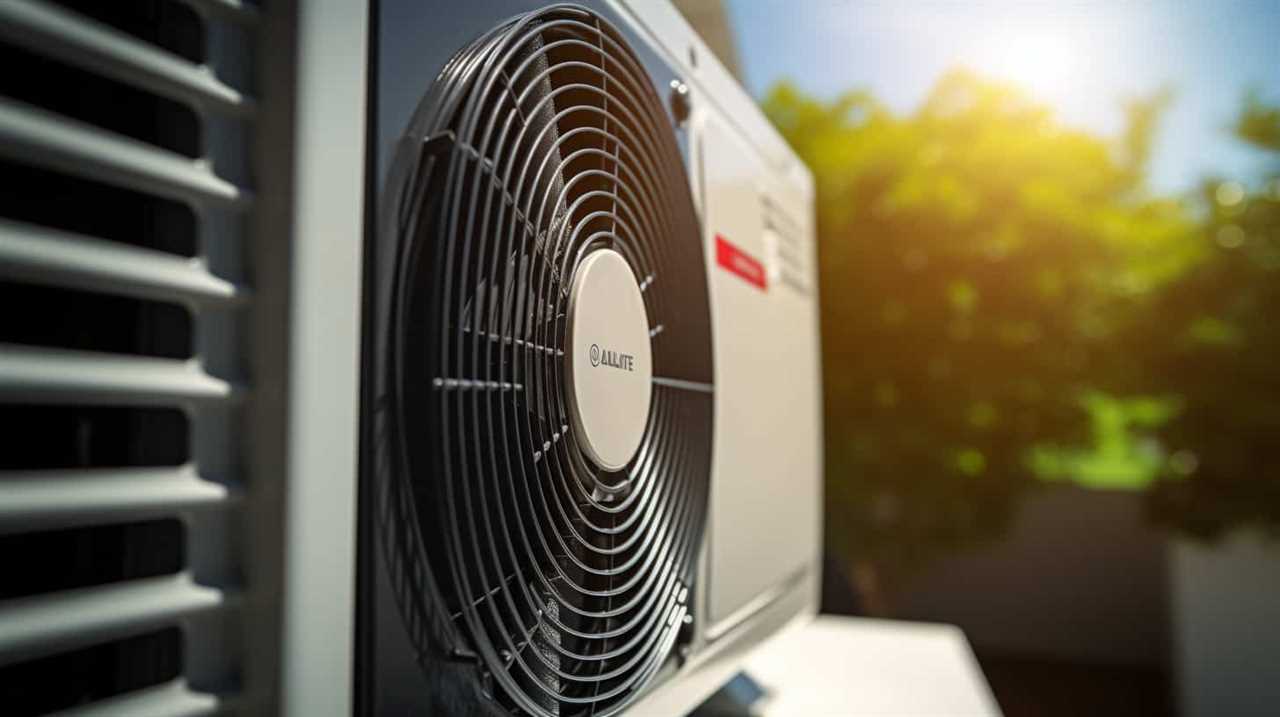
| Heating and Cooling System | Annual Energy Cost |
|---|---|
| Traditional HVAC System | $1,800 |
| Residential Heat Pump | $1,200 |
As shown in the table, the residential heat pump can save homeowners approximately $600 per year in energy costs compared to a traditional HVAC system. Over the lifespan of the heat pump, which can be 15 to 20 years with proper maintenance, the financial savings can be substantial.
Potential Increase in Property Value
Installing residential heat pumps can significantly boost the value of our property. Here are three reasons why:
-
Increase in market demand: With the growing awareness of the need for energy-efficient and sustainable living, residential heat pumps have become increasingly popular. Potential buyers are actively seeking properties that already have these systems in place, which can lead to higher demand and increased property value.
-
Improved property aesthetics: Heat pumps are designed to be sleek and compact, blending seamlessly into the exterior of our homes. This enhances the overall appearance and curb appeal of our property. A well-maintained heat pump system can contribute to a more attractive and visually appealing exterior, creating a positive impression on potential buyers.
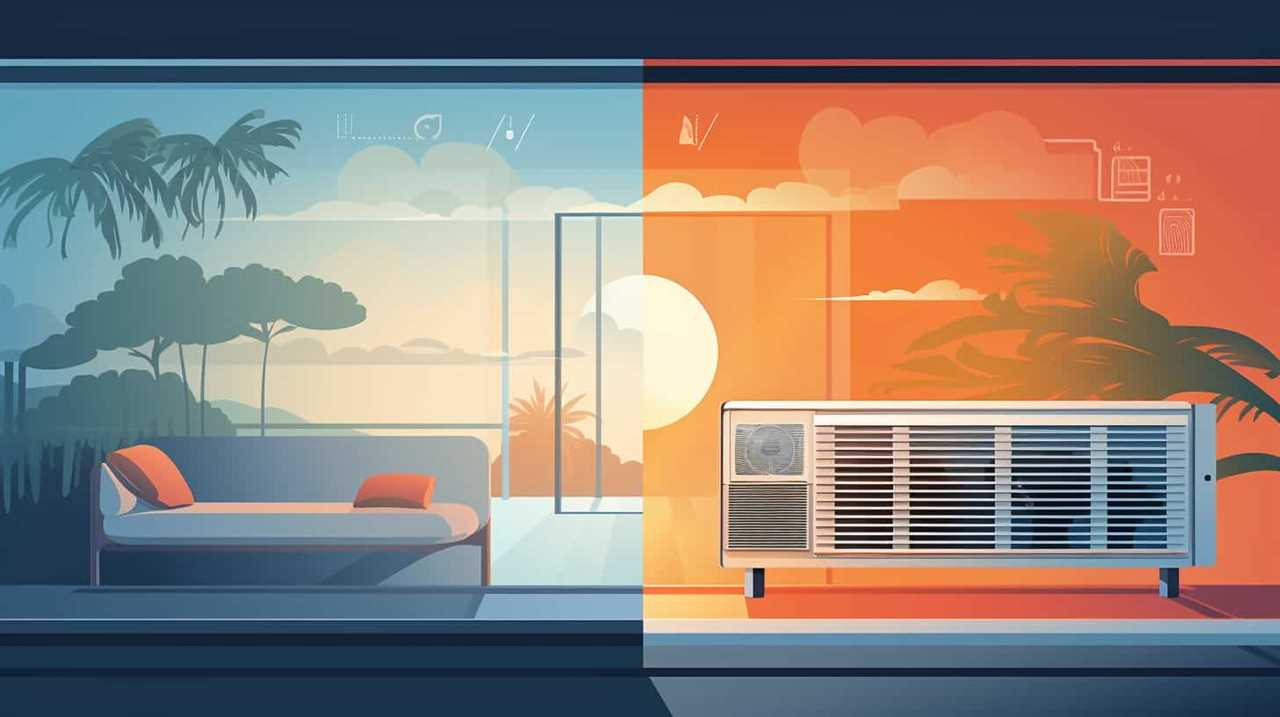
-
Energy savings: Residential heat pumps are known for their energy-efficient operation. By reducing our reliance on traditional heating and cooling systems, we can significantly lower our utility bills. This cost-saving benefit adds value to our property as potential buyers appreciate the long-term financial savings associated with a heat pump system.
Investing in a residential heat pump not only provides us with comfort and efficiency but also offers the potential for a higher property value.
Frequently Asked Questions
Are There Any Potential Drawbacks or Disadvantages to Using Residential Heat Pumps?
There can be potential drawbacks and disadvantages when using residential heat pumps. It’s important to consider factors such as initial cost, noise levels, and the need for regular maintenance to ensure optimal performance and efficiency.
How Do Residential Heat Pumps Compare to Traditional Heating and Cooling Systems in Terms of Installation and Maintenance Costs?
When comparing installation and maintenance costs, residential heat pumps offer significant advantages over traditional systems. The initial investment may be higher, but the long-term energy savings and efficiency make them a worthwhile choice.

Can Residential Heat Pumps Be Integrated With Existing HVAC Systems?
Residential heat pumps can be integrated with existing HVAC systems, offering various benefits such as improved energy efficiency and reduced operating costs. However, drawbacks include the need for compatible equipment and potential installation challenges.
What Factors Should Be Considered When Determining the Appropriate Size and Capacity of a Residential Heat Pump for a Specific Home?
When determining the size and capacity of a residential heat pump for a specific home, factors such as square footage, insulation, climate, and desired comfort levels should be considered. Proper sizing ensures optimal performance and energy efficiency.
Are There Any Specific Maintenance Tasks or Considerations That Homeowners Should Be Aware of When Using Residential Heat Pumps?
Maintenance tasks and considerations for residential heat pumps include regular filter cleaning or replacement, checking refrigerant levels, inspecting electrical connections, and ensuring proper airflow. These tasks help optimize performance and extend the lifespan of the heat pump.
Conclusion
In conclusion, residential heat pumps offer numerous advantages. These include lower energy bills, increased energy efficiency, and improved indoor air quality. Some may argue that the initial cost of installing a heat pump is high. However, the long-term cost savings and potential increase in property value outweigh this concern. Moreover, heat pumps are eligible for tax credits and incentives, making them an environmentally friendly solution for year-round comfort. Upgrade to a residential heat pump today and experience the many benefits it has to offer.




